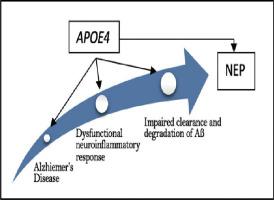当前位置:
X-MOL 学术
›
J. Neuroimmunol.
›
论文详情
Our official English website, www.x-mol.net, welcomes your feedback! (Note: you will need to create a separate account there.)
Neuroinflammation drives APOE genotype-dependent differential expression of neprilysin
Journal of Neuroimmunology ( IF 3.3 ) Pub Date : 2020-09-01 , DOI: 10.1016/j.jneuroim.2020.577315 David Graykowski 1 , Kyle Kasparian 1 , John Caniglia 1 , Yelena Gritsaeva 1 , Eiron Cudaback 1
Journal of Neuroimmunology ( IF 3.3 ) Pub Date : 2020-09-01 , DOI: 10.1016/j.jneuroim.2020.577315 David Graykowski 1 , Kyle Kasparian 1 , John Caniglia 1 , Yelena Gritsaeva 1 , Eiron Cudaback 1
Affiliation

|
Alzheimer's disease (AD) is a devastating neurodegenerative disorder characterized by the deposition of amyloid-beta (Aβ) plaques and widespread neuroinflammation. While the cause of AD remains unknown, multiple factors likely contribute to the disease, including heart disease, diabetes, previous head injury, as well as a number of genetic determinants. Inheritance of the apolipoprotein (APOE) ε4 allele represents the strongest genetic risk factor for development of AD, driving pathogenesis and increasing overall disease severity. APOE has long been recognized as a key regulator of cholesterol homeostasis, although a greater appreciation now exists for its role in various innate immune system processes. Indeed, APOE modulates inflammatory environments in brain in large part by altering gene expression profiles in glia, important mediators of immunity in the CNS. While the association between APOE and AD was first observed nearly three decades ago, the mechanism by which APOE ε4 influences the etiology and pathophysiology of AD is not well characterized. Overwhelming data supports the hypothesis that APOE ε4 dysregulates central amyloid metabolism by an undetermined molecular mechanism, thus laying the foundation for disease. A host of amyloid-degrading enzymes (ADEs) regulate Aβ accumulation in brain, and therefore represent valuable therapeutic targets. Neprilysin (NEP), a metalloendopeptidase expressed by activated microglia and astrocytes, is a broad-spectrum ADE able to degrade a variety of Aβ species. Here we describe in vivo and in vitro experiments designed to investigate the potential for APOE genotype to differentially regulate glial NEP in brain under neuroinflammatory conditions. Our results provide a novel mechanism by which APOE genotype-dependent differential expression of NEP by glia during neuroinflammation may contribute to AD pathogenesis.
中文翻译:

神经炎症驱动脑啡肽酶的 APOE 基因型依赖性差异表达
阿尔茨海默病 (AD) 是一种破坏性的神经退行性疾病,其特征是淀粉样蛋白 β (Aβ) 斑块的沉积和广泛的神经炎症。虽然 AD 的病因尚不清楚,但多种因素可能导致该疾病,包括心脏病、糖尿病、先前的头部受伤以及许多遗传决定因素。载脂蛋白 (APOE) ε4 等位基因的遗传代表了 AD 发展、驱动发病机制和增加整体疾病严重程度的最强遗传风险因素。APOE 长期以来一直被认为是胆固醇稳态的关键调节剂,尽管现在人们对其在各种先天免疫系统过程中的作用有了更大的认识。事实上,APOE 在很大程度上通过改变神经胶质中的基因表达谱来调节大脑中的炎症环境,中枢神经系统免疫的重要介质。虽然 APOE 和 AD 之间的关联是在近三年前首次观察到的,但 APOE ε4 影响 AD 病因和病理生理学的机制尚未得到很好的表征。压倒性的数据支持这样的假设,即 APOE ε4 通过未确定的分子机制失调中枢淀粉样蛋白代谢,从而为疾病奠定基础。许多淀粉样蛋白降解酶 (ADE) 调节大脑中 Aβ 的积累,因此代表了有价值的治疗靶点。Neprilysin (NEP) 是一种由活化的小胶质细胞和星形胶质细胞表达的金属内肽酶,是一种广谱 ADE,能够降解多种 Aβ 物质。在这里,我们描述了体内和体外实验,旨在研究 APOE 基因型在神经炎症条件下差异调节大脑神经胶质 NEP 的潜力。我们的研究结果提供了一种新机制,通过该机制,神经炎症期间神经胶质细胞对 NEP 的 APOE 基因型依赖性差异表达可能有助于 AD 发病机制。
更新日期:2020-09-01
中文翻译:

神经炎症驱动脑啡肽酶的 APOE 基因型依赖性差异表达
阿尔茨海默病 (AD) 是一种破坏性的神经退行性疾病,其特征是淀粉样蛋白 β (Aβ) 斑块的沉积和广泛的神经炎症。虽然 AD 的病因尚不清楚,但多种因素可能导致该疾病,包括心脏病、糖尿病、先前的头部受伤以及许多遗传决定因素。载脂蛋白 (APOE) ε4 等位基因的遗传代表了 AD 发展、驱动发病机制和增加整体疾病严重程度的最强遗传风险因素。APOE 长期以来一直被认为是胆固醇稳态的关键调节剂,尽管现在人们对其在各种先天免疫系统过程中的作用有了更大的认识。事实上,APOE 在很大程度上通过改变神经胶质中的基因表达谱来调节大脑中的炎症环境,中枢神经系统免疫的重要介质。虽然 APOE 和 AD 之间的关联是在近三年前首次观察到的,但 APOE ε4 影响 AD 病因和病理生理学的机制尚未得到很好的表征。压倒性的数据支持这样的假设,即 APOE ε4 通过未确定的分子机制失调中枢淀粉样蛋白代谢,从而为疾病奠定基础。许多淀粉样蛋白降解酶 (ADE) 调节大脑中 Aβ 的积累,因此代表了有价值的治疗靶点。Neprilysin (NEP) 是一种由活化的小胶质细胞和星形胶质细胞表达的金属内肽酶,是一种广谱 ADE,能够降解多种 Aβ 物质。在这里,我们描述了体内和体外实验,旨在研究 APOE 基因型在神经炎症条件下差异调节大脑神经胶质 NEP 的潜力。我们的研究结果提供了一种新机制,通过该机制,神经炎症期间神经胶质细胞对 NEP 的 APOE 基因型依赖性差异表达可能有助于 AD 发病机制。


























 京公网安备 11010802027423号
京公网安备 11010802027423号